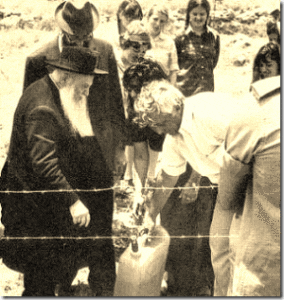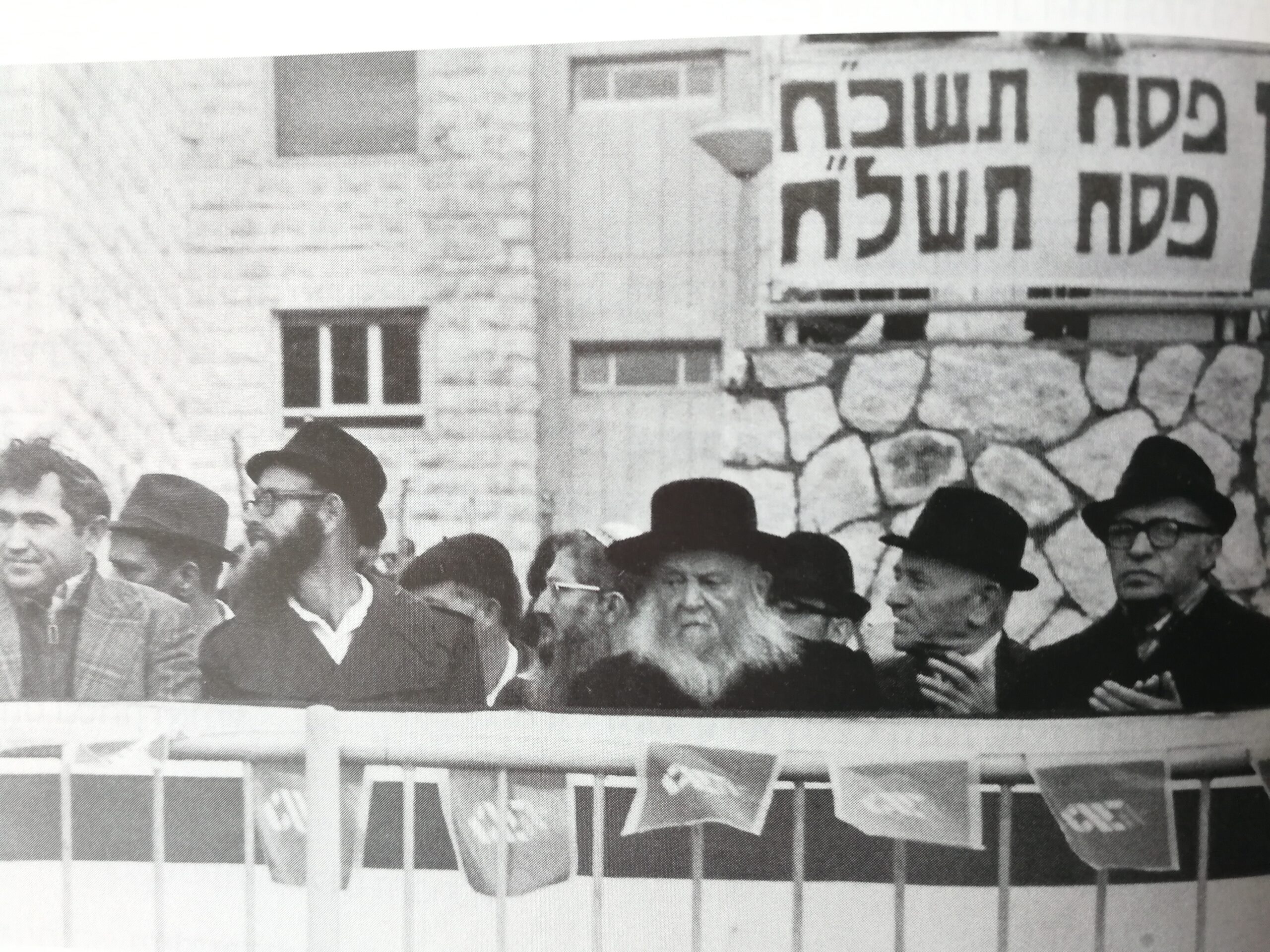Father of the Settlements – HaRav Tzvi Yehuda Kook
By Rabbi David Samson, author of the book “Torat Eretz Yisrael” on the life and teachings of HaRav Tzvi Yehuda HaKohen Kook
 The settlement movement in Israel did not start on the windswept of hills of Samaria, but in a small apartment in the Geula neighborhood of Jerusalem, in the modest home of HaRav Tzvi Yehuda Kook, head of the Mercaz HaRav Yeshiva and son of HaRav Avraham Yitzhak HaKohen Kook, Israel’s first Ashkenazi Chief Rabbi. Both father and son taught their generations to see the Divine Hand in the return of Am Yisrael to Eretz Yisrael, and to recognize the Divine Providence in the rebuilding of Jewish Nationhood in Zion. In addition to the classes he taught in the yeshiva, students visited his home for classes in the prolific writings of his father. Often, out of awe for his father’s teaching, HaRav Tzvi Yehuda would simply read the text, without offering any commentary on his own. Out of his colossal respect for his father, he completely hid his own Torah greatness. For thirty years he secluded himself in his apartment, editing and publishing his father’s books. When asked who was the Gadol HaDor of the previous generation, Rabbenu would reply decisively, “Abba!” When he was asked if a certain great Rabbi had been the Gadol HaDor, he banged his hand on his desk and declared in a loud voice, “The Gadol HaDor was Abba!”
The settlement movement in Israel did not start on the windswept of hills of Samaria, but in a small apartment in the Geula neighborhood of Jerusalem, in the modest home of HaRav Tzvi Yehuda Kook, head of the Mercaz HaRav Yeshiva and son of HaRav Avraham Yitzhak HaKohen Kook, Israel’s first Ashkenazi Chief Rabbi. Both father and son taught their generations to see the Divine Hand in the return of Am Yisrael to Eretz Yisrael, and to recognize the Divine Providence in the rebuilding of Jewish Nationhood in Zion. In addition to the classes he taught in the yeshiva, students visited his home for classes in the prolific writings of his father. Often, out of awe for his father’s teaching, HaRav Tzvi Yehuda would simply read the text, without offering any commentary on his own. Out of his colossal respect for his father, he completely hid his own Torah greatness. For thirty years he secluded himself in his apartment, editing and publishing his father’s books. When asked who was the Gadol HaDor of the previous generation, Rabbenu would reply decisively, “Abba!” When he was asked if a certain great Rabbi had been the Gadol HaDor, he banged his hand on his desk and declared in a loud voice, “The Gadol HaDor was Abba!”
A “Who’s Who” of his students could fill a whole book. For instance, in no special order: Rabbis Hanan Porat, Moshe Levinger, Haim Druckman, Dov Lior, Zalman Melamed, Shlomo Aviner, Tzvi Tau, Eliezer Waldman, Haim Steiner, Yaacov Shapira, Shmuel Eliahu, and many more Rabbis and Roshei Yeshivot. He encouraged many students to leave the Mercaz HaRav Yeshiva and become the pioneer settlers who created the “facts on the ground,” settlements of Hevron, Bet El, Elon Moreh, Ofra, Shilo, Kfar Etzion, Kiriat Arba, and the moshavim of the Golan Heights. While his humility was obvious to all, it did not prevent him from standing up like a lion in defense of the Torah and the Land of Israel. His powerful words still echo in my head today. For instance, he loudly proclaimed: “In line with the holy words of my Father and teacher, HaRav, of blessed memory, regarding the ‘illegal’ Jewish immigration to Israel in the days of the British rule in the Land – my Father said that it was not the Aliyah to Israel that was illegal; rather the prevention of Aliyah was the absolutely illegal act. So too today, it is not the settlement of Israel which is illegal – its prevention is illegal, for we are commanded to conquer and settle the full breath and width of the Land.”
HaRav Tzvi Yehuda didn’t tell students specifically to leave the yeshiva. Everyone understood from his teachings that this was the commandment of the hour. Students would come to his home and tell him that they wanted to start a new yishuv in Samaria or along the Gaza border, and he would give them his blessing as a Kohen. For him, building settlements in the Land of Israel was the natural extension of Torah learning, just as Yehoshua’s conquest of Eretz Yisrael was a natural continuation of the Torah which the Jewish People received at Sinai. He often noted that the words “yeshiva” and “yishuv” have the same root, and emphasized that building new settlements was not ‘bitul Torah,’ but Torah itself, in fulfillment of the Hashem’s repeated command to settle the Land and keep it under Jewish sovereignty. For him, each new settlement was the fulfillment of the Divine prophecies which envisioned the day when the blighted and desolate homeland would blossom and be resurrected to life. Often, he himself accompanied his students to the hilltops of Judea and Samaria to plant the first sapling as his children erected tents and dragged generators and building materials to the site. I use the word children meaning his students. HaRav Tzvi Yehuda didn’t have children of his own. His students were his children. Hundreds and hundreds of budding Torah Scholars who revered him as a father. Interestingly, when students speak about him, whether they turned out to be Roshei Yeshivot, army commanders, teachers, physicians, real-estate developers, or Knesset members, each one will tell you that he had a special relationship with Rabbi Kook. He made each of us feel like a beloved child.
For example, I remember my very first meeting with the Rosh Yeshiva. In the month of Elul, at the very beginning of each year, HaRav Tzvi Yehuda would lecture about Emunah and the vital importance of approaching Torah learning from the point of view of the Clal, in its national aspect, as the Torah of the Nation, in all of its facets. On the very first day of my learning at Mercaz HaRav, I fell ill and missed the opening lecture. A few days later, when I recovered, I took a place in the line of students who always waited to ask the Rosh Yeshiva questions at the conclusion of morning prayers. When my turn came, I told HaRav Tzvi Yehuda that I had been sick and missed the opening lecture. To my surprise, he sat me down, asked how I was feeling and inquired about the details of my illness. Then for nearly an hour, while other students were waiting, he explained the class I had missed. He took the time to go over the entire initial lesson with me alone.
He taught us to love every Jew with an unlimited love, whether he or she was secular or Haredi. Like his father’s renowned love for all mankind, his love extended to everyone. If he heard about an incident where an Arab was treated unfairly, on several occasions he sent off a letter to a newspaper to voice his displeasure. But he would always stress that our respect for our Arab neighbors did not extend to granting them any sovereignty whatsoever over Eretz Yisrael. He repeatedly stated that Arabs were welcome to live peacefully alongside the Jewish People in the country, but that they could not have any national rule here. HaRav Tzvi Yehuda made it clear that in any discussions with non-Jews, the starting point must be that the other side acknowledge, without any room for negotiation or compromise, that the entire Land of Israel belongs to the Jewish People for all eternity. Over and over, the Rosh Yeshiva stressed that our rule over Eretz Yisrael is founded upon the Divine Promise of the Land to the Jewish People. He compared the situation to a man who was forcefully expelled from his home, Afterwards the home was stolen by one conqueror after the next. That is exactly what happened to us. In the past century, when we returned to Eretz Yisrael, the country was in the hands of the Turks who turned it over to the British, who were internationally commissioned with the task of helping the Jews establish a State. Rabbi Kook stressed that the Arabs had, and have, absolutely no national right to the Land. If they deny the justice of our cause, and choose to go to war against us, then we must persuade them, he said, with our tanks.
“HaRav Tzvi Yehuda emphasized that not only the surrender of any piece of our Land was forbidden, even all expressions of surrendering territory were as strictly forbidden as eating pork. In a time of war, he said, expressions of weakness are anathema to the strengthening of the Nation. He said that we must guard against language which leads to discouragement and a weakness of heart, in line with the Torah’s commandment to soldiers not to melt the hearts of their brothers because of their fears of war. We are not to be afraid the Gentile nations, nor give in to their demands. All proposals of withdrawal, autonomy, and foreign sovereignty over the smallest part of the Land of Israel are traf, he said, and must be adamantly avoided. Just as no letter of the Torah is allowed to be erased, and no Jew is allowed to be abandoned, HaRav Tzvi Yehuda vehemently maintained that no handful of Israeli soil, however small, is allowed to be transferred to foreign control. He taught that we must rather strengthen our rule over Israel, throughout all of our Biblical borders, and that all interference on the part of the Gentiles is null and void.






